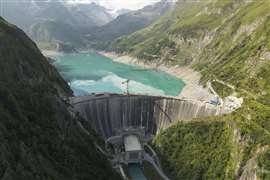The future of German infrastructure
06 June 2022
The new federal government has invested significantly in the future of German infrastructure projects and plans to restore the country’s bridges are well on their way, writes Catrin Jones.
As was the case with most countries around the world, the German construction industry saw activity and revenue fall due to the impact of the Covid-19 pandemic.
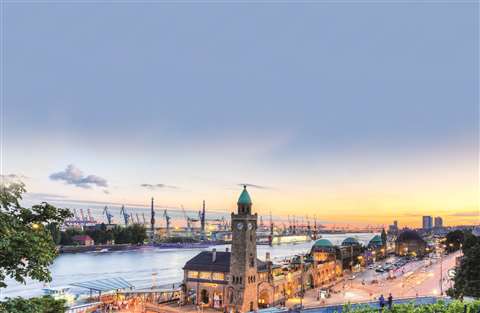 The government are hoping to attract 400,000 new workers per year (Photo: AdobeStock)
The government are hoping to attract 400,000 new workers per year (Photo: AdobeStock)
Recovery has been fairly swift though – ConsTrack360, a global construction insight and data platform, estimated in their Q4 2021 Global Construction Survey that the construction industry in Germany is expected to grow by 11.1% in 2022.
The country’s machinery exports also saw significant growth in 2021 as a result of the robust economic recovery in key markets.
Machinery exports are said to have risen by almost 10% in nominal terms to €179.4 billion (US$195.7 billion). China remains top for machinery exports – sales to the world’s biggest market for construction equipment rose more than 26% to €210 billion (US$229 billion).
Ralph Wiechers, chief economist, at the VDMA, an association for the mechanical engineering industry in Germany and Europe, expresses some concern over these figures. “The development in the EU domestic market is a worrying factor. With an increase of 32%, Chinese machinery exports to the EU, excluding Germany, grew significantly faster than German machinery exports to EU partner countries (plus 11%). This means that China also increased its market share in the EU last year,” he says.
“However, it is important to note that a significant proportion of China’s machinery exports come from manufacturing facilities operated by foreign companies in China or in which they have a stake in the form of joint ventures.”
The construction equipment sector achieved a nominal increase of 18%. Nonetheless, expectations for this year remain cautious. The biggest risk lies in ongoing supply disruptions, according to many manufacturers.
“We are pushing a wave of orders ahead of us that we will probably have to carry into 2023 if the situation remains like this,” says Joachim Strobel, chairman of the VDMA’s construction equipment division.
“Despite full order books, the industry can only expect a maximum increase in turnover of 7% for the current year. Profit will also fall short of our expectations because we have to contend with enormously increased costs.”
Innovation in climate-neutrality
The German government is planning to build 400,000 new apartments a year, of which 100,000 are to be publicly subsidised, in addition to the goal of being climate-neutral by 2045.
This is more than 50,000 units higher compared to the current goal and 100,000 more than what the construction industry has managed to build as of November 2021.
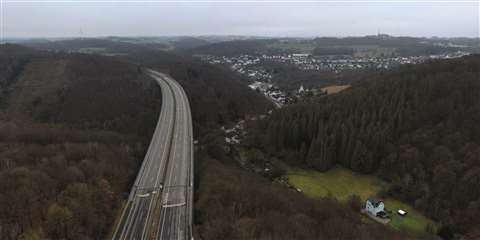 Several dilapidated bridges across Germany need repair (Photo: AdobeStock)
Several dilapidated bridges across Germany need repair (Photo: AdobeStock)
“This presents the construction industry with challenges that cannot be solved with a ‘business as usual’ approach,” says Tim-Oliver Müller, chief executive officer of the German Construction Industry Association.
“Innovation is urgently needed to enable us to master these tasks. Industrial processes, automation and robotics are therefore future topics for the industry, but we are still in our infancy.”
Accurate and cohesive planning for projects is key, adds Müller. “Currently, the planning and construction process of a building is fragmented into many individual parts. This is often fine, but it cannot always be the right way to go, especially for time-critical and complex projects. We need to stop thinking in mini units.
“Instead, we need to allow the idea of performance from a single source. Not one after the other, but with each other – and from the planning stage onward.”
Preventing demolition of infrastructure
Müller believes that bridge construction is high on the list of infrastructure projects for Germany. A large number of motorway bridges have become dilapidated beyond repair – such as the Rahmede motorway bridge near Lüdenscheid, which is set to be blown up this year.
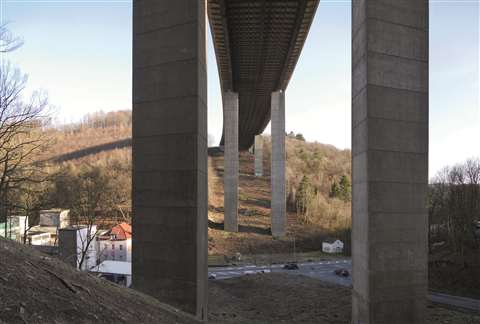 The Rahmede motorway bridge is set to be demolished this year (Photo: AdobeStock)
The Rahmede motorway bridge is set to be demolished this year (Photo: AdobeStock)
The new government has promised that large construction projects will be implemented quicker and Federal Transport Minister Volker Wissing intends to bring this to fruition, starting with the demolition of the Rahmede viaduct.
“The package of measures recently presented by Federal Transport Minister Wissing, therefore, starts where it hurts – with complete transparency about the actual condition of our bridges and to make priority processing possible,” adds Müller.
A budget of €530 million (US$578 million) has been given by the German government’s road firm, Autobahn. This will aim to improve bridges across the network and prevent having to demolish and rebuild new structures in the future.
One of the main trends in the German construction industry is said to be renting machines rather than buying them. Among the many advantages are reduced investment budgets, increased flexibility, and saved resources for machine maintenance.
“Ownership means commitment. If you want to call a construction machine your own, you must plan for repair and maintenance expenses as well as spare parts and general wear and tear,” says Thomas Kramer, general manager, Dynapac Germany.
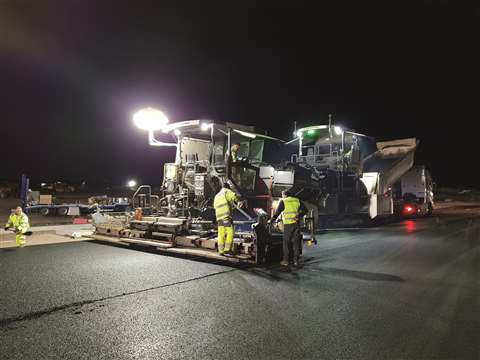 One of the trends in Germany is said to be increased renting of construction equipment
One of the trends in Germany is said to be increased renting of construction equipment
“Cost control, planning security, is becoming an increasingly important factor. That’s why many of our customers are now demanding other solutions.”
Permanent digital tool upgrades on the construction site, legal regulations, as well as the trend toward autonomous working, are also contributing to the fact that the construction industry is increasingly asking for rental and leasing models.
Tackling construction’s skill shortage
More infrastructure means more business, but this brings additional challenges when supply chain issues and a skills shortage are still rife.
Germany’s new coalition government is planning to attract 400,000 skilled workers from abroad per year in a bid to tackle the labour shortages across key sectors in construction.
The government also believes that the increasing rate of the statutory minimum wage – from €9.82 to €10.45 (US$11.40) on 1 July, and then to €12 (US$13.09) on 1 October – will be attractive to overseas workers.
Unfortunately, this comes at a cost to those in the industry as construction workers previously benefitted from an industry-specific minimum wage of €12.85 (US$14.01) – this expired at the end of last year and the statutory minimum wage will now apply.
Federal chairman of Industriegewerkschaft Bauen-Agrar-Umwelt (IG BAU), a German trade union active in the construction industry, Robert Feiger, says that the change in the minimum wage would be fatal for the construction industry with the major tasks that lie ahead and the high need for skilled workers at the same time.
Müller from VDMA, on the other hand, is optimistic. He believes that the demand for skilled workers will encourage companies to continue to pay above the minimum wage in a bid to remain attractive against competitors.
Carbon neutral construction targets
According to the Federal Environment Agency, buildings in Germany emitted a total of 115 million tons of greenhouse gases last year, which is 3.3% less than the previous year.
However, it is reported that the sector continues to fall short of the federal government’s annual savings target of 113 million tons of CO2 with an aim for buildings to be emission-free by 2045.
“Politicians must not leave the industry alone,” is the view of IG BAU’s Feiger. “Additional funding is needed to create incentives for energy-saving refurbishment so that the mammoth task of climate neutrality in the building sector can be mastered.”
Germany has their own set of targets to combat but, according to the Federal Ministry for Economic Cooperation and Development, they are extending help to other countries to enable them to reach sustainability targets.
Investment in green infrastructure
Germany and Indonesia have agreed to work together to develop green infrastructure. Up to €2.5 billion (US$2.7 billion) will be made available as part of loans to spend on climate and environment-related infrastructure projects in urban areas. Indonesia is the world’s eighth biggest emitter of greenhouse gases.
Development Minister, Svenja Schulze, said, “In order to make progress in efforts to protect the climate, while at the same time improving people’s living conditions, will require massive investment in green infrastructure development.
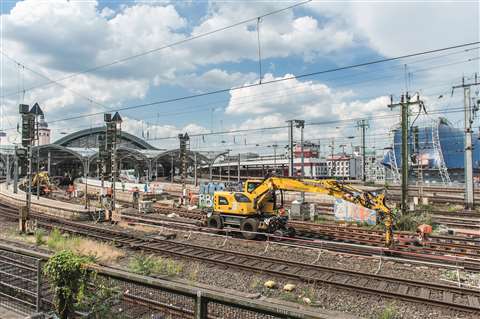 There has been heavy investment in German infrastructure projects (Photo: AdobeStock)
There has been heavy investment in German infrastructure projects (Photo: AdobeStock)
“That is why the implementation of the Indonesian-German Green Infrastructure Initiative has high priority under German development cooperation.”
One of the projects already scheduled is the Surabaya-Bangkalan Autonomous Railrapid Transit, in Central Java, which is estimated to be worth €216 million (US$235 million).
Germany is one of the world’s leading markets for construction, and growth momentum is expected to continue. The sector is expected to grow steadily over the next four years, recording a compound annual growth rate (CAGR) of 6.3% from 2022 to 2026.
Heavy investment from a new government will hopefully restore and repair decaying infrastructure but will require more labour. To remain attractive among other industries greater consideration must be placed on attracting a skilled workforce and maintaining them with a substantial wage.
STAY CONNECTED


Receive the information you need when you need it through our world-leading magazines, newsletters and daily briefings.
CONNECT WITH THE TEAM










